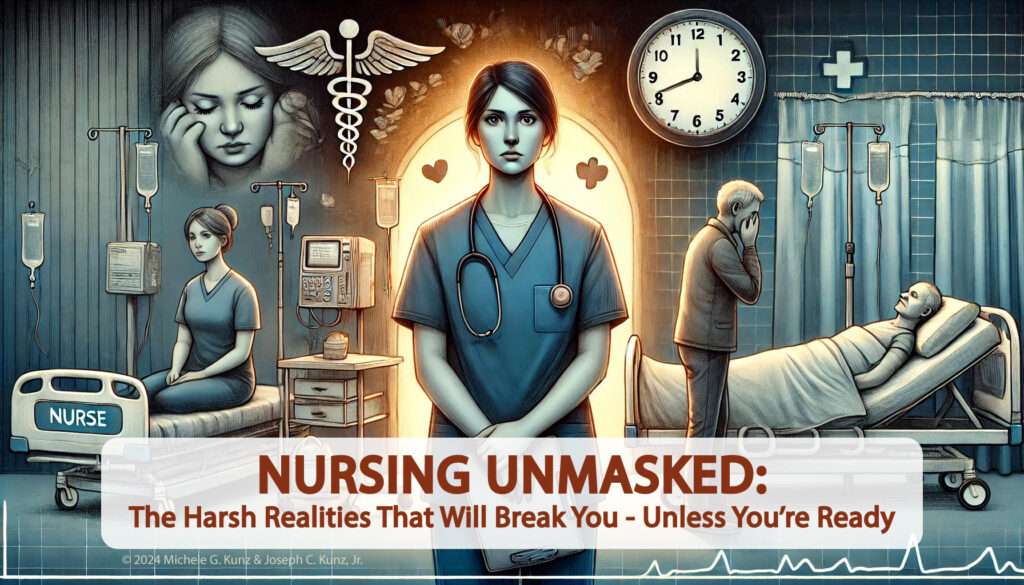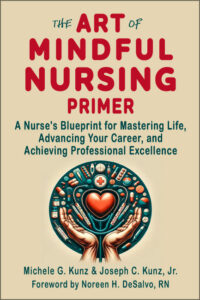Subtitle
Surviving the Grit, Grind, and Gut-Wrenching Moments of a Nurse’s Life
Synopsis
The article offers an unfiltered look at nursing challenges, particularly for students and new nurses. Written by a critical care nurse with over 45 years of experience, the article addresses the emotional and physical toll of the profession, including underappreciation, high workloads, and mistakes. Through mindfulness strategies, it provides guidance on coping with these realities, fostering resilience, self-care, and patient advocacy. While acknowledging the profession’s difficulties, the article offers hope and purpose for nurses at every stage.

Introduction
While noble and rewarding, nursing is a career marked by profound fulfillment and harsh realities. For over 45 years as a critical care nurse and nursing educator, I’ve seen the depths of what this profession entails. I’ve laughed, cried, struggled, triumphed, and grown alongside my colleagues. I’ve watched students become seasoned professionals, and those same professionals face challenges they could never have imagined. Through it all, I’ve learned that embracing the profession’s harsh truths with mindfulness, grace, and determination is the only way to survive and thrive in nursing.
This article is dedicated to nursing students and new nurses stepping into the world of nursing, often without a complete understanding of the challenges ahead. Here are the most important truths you’ll need to navigate and the mindful strategies to help you cope and excel.
A. Nursing Is Physically and Emotionally Draining
Nursing is one of the most physically demanding professions out there. You might be on your feet for 12 hours a day, moving constantly, lifting patients, adjusting equipment, and responding to emergencies. Add to that the constant need for mental agility, and you have a recipe for complete exhaustion. The physical toll of nursing can leave you feeling as if your body has been through a marathon after every shift.
But the emotional strain is just as heavy—if not heavier. You will bear witness to life’s most intense moments: birth, illness, recovery, and death. You’ll provide comfort to patients and families during their most vulnerable times and carry the weight of their suffering long after your shift ends. Over time, this emotional burden can accumulate, leading to burnout, compassion fatigue, and even depression.
- 1. Mindfulness Strategy: Practicing mindfulness can be beneficial to manage both physical and emotional exhaustion. You can recalibrate your mental and emotional state by focusing on your breathing during stressful moments or taking short, mindful pauses. Mindfulness allows you to be fully present, focusing on the task at hand without becoming overwhelmed by the entire day ahead. Small mindful practices, like deep breathing or body scans, can also help alleviate physical tension, keeping you grounded and in tune with your own needs.
2. Advice: Prioritize self-care and recovery after each shift. Whether it’s stretching, exercising, meditating, or even spending quiet time with loved ones, you must carve out time to recharge. Acknowledge your emotional exhaustion, and allow yourself to feel it without judgment. Practice mindful self-compassion; understand that it’s okay to have moments of emotional fatigue—what matters is how you respond to it.
B. You Will Be Underappreciated—A Lot
Nurses are often the unsung heroes of the healthcare system. While your work is critical, it can frequently feel thankless. Many patients won’t understand or recognize the care you’re giving them. Family members may be too overwhelmed by their loved one’s condition to express appreciation; some may even direct their frustrations toward you. In some settings, your colleagues may not always appreciate your efforts, especially as a new nurse trying to find your place within the team.
The lack of recognition can be disheartening. It’s hard to keep going when you feel invisible, and this can make you question your value as a nurse. This feeling is particularly strong when you’re just starting and want validation that you’re doing a good job.
- 1. Mindfulness Strategy: Mindfulness encourages us to let go of the need for external validation. By cultivating an internal sense of worth, you can learn to derive satisfaction from the act of caring itself rather than waiting for acknowledgment from others. Practice being fully present with each patient and in each task, knowing that the quiet acts of care you provide—like adjusting a patient’s pillow or offering a reassuring word—are valuable, even if no one says “thank you.”
2. Advice: Keep a mental journal of your small victories. Maybe a patient smiled for the first time in days because of your efforts, or perhaps you helped a family member better understand what’s happening with their loved one. These moments are where your value truly lies. In nursing, the work is often thankless, but it is never meaningless.
C. You Won’t Know Everything (And That’s Okay)
Entering the workforce as a new nurse is overwhelming. Even with all your training and clinical experience, you will often feel like there’s so much you don’t know. You’ll encounter complex medical conditions, new technologies, and patient behaviors that aren’t covered in textbooks. This can lead to feelings of insecurity or self-doubt, especially when you’re surrounded by more experienced nurses who seem to handle everything with ease.
But here’s the truth: Even after 45 years in nursing, I still encounter situations that challenge my knowledge. Medicine evolves constantly, and no one—no matter how experienced—knows everything. It’s okay to admit you don’t have all the answers.
- 1. Mindfulness Strategy: Mindfulness encourages a beginner’s mind, a concept that involves approaching each situation with curiosity and openness rather than fear. By adopting this mindset, you’ll become comfortable with asking questions and seeking advice. Mindfulness helps reduce the pressure to be perfect and allows you to focus on learning rather than stressing about what you don’t know.
2. Advice: Be humble and embrace the learning process. Use your inexperience as an opportunity to learn from others. Ask questions, seek feedback, and never stop learning. By practicing mindfulness, you’ll stay grounded and present, which will help you avoid the anxiety of feeling overwhelmed by the unknown.
D. Short Staffing and High Patient Ratios Are the Norm
Many healthcare facilities operate with fewer nurses than they should. It’s common to be assigned more patients than you can reasonably care for during a shift, especially in high-acuity areas like critical care or emergency departments. This isn’t just an inconvenience—it’s a dangerous reality that can affect patient outcomes and increase stress for nurses.
When short-staffed, you’ll find yourself running from task to task, feeling like you’re always a step behind. You may not have enough time to provide the level of care you want to each patient, which can lead to feelings of guilt or inadequacy. The pressure is constant, and the stakes are high.
- 1. Mindfulness Strategy: Mindfulness can help you prioritize your time and stay focused on the task at hand. When you’re dealing with a high patient load, it’s easy to become overwhelmed by everything you need to do. By practicing mindful presence, you can focus on one task at a time, giving it your full attention, which improves the quality of care you provide at the moment. Mindfulness also helps you manage stress and stay calm in high-pressure situations.
2. Advice: Accept that you won’t be able to do everything perfectly, and focus on what matters most. Prioritize your patients’ critical needs, and don’t hesitate to ask for help if you need it. Mindful time management—such as taking a deep breath before moving from one task to another—will help you stay grounded, even in chaotic shifts.
E. Nursing Is Not Glamorous
Forget the television dramas that depict nursing as exciting and glamorous. In reality, much of your work will involve cleaning up bodily fluids, handling unpleasant smells, and performing tasks that are far from what people imagine when they think of “saving lives.” You’ll often feel more like a housekeeper or caretaker than a healthcare professional. And while the work is rewarding, it’s not always thrilling.
But here’s the thing: the heart of nursing isn’t about the glamor. It’s about service. It’s about providing care when no one else is willing or able. Those “messy” tasks are integral to your patients’ well-being, even if they don’t receive recognition or glory.
- 1. Mindfulness Strategy: Mindfulness teaches us to find value and meaning in the present moment, no matter how mundane or unpleasant it might seem. By practicing mindfulness during routine tasks, you can transform them into moments of connection and care. Whether you’re cleaning a patient’s wound or simply adjusting their bed, mindfulness helps you stay present and attentive, turning each task into a meaningful act of service.
2. Advice: Embrace the reality that nursing is about the small, quiet moments of care. Find pride in the unglamorous aspects of the job, knowing that they are essential to your patient’s health and comfort. Mindfulness will help you approach even the most tedious tasks with a sense of purpose.
F. Mistakes Will Happen—And They Can Be Serious
No matter how diligent you are, mistakes are inevitable in nursing. It’s a high-stakes profession, and the potential for error is always present. Whether it’s a medication mistake, a miscommunication with a colleague, or a momentary lapse in judgment, mistakes in nursing can have severe consequences for patients.
It’s terrifying, especially for new nurses, to confront the reality that errors are part of the job. The fear of making a mistake can create anxiety and self-doubt, but it’s essential to understand that mistakes are opportunities for learning and growth.
- 1. Mindfulness Strategy: Mindfulness helps you acknowledge your mistakes without judgment or harsh self-criticism. Instead of spiraling into guilt or fear, mindfulness allows you to step back, assess what went wrong, and take corrective action. By approaching mistakes with a calm, present mind, you can learn from them and move forward without being weighed down by self-blame.
2. Advice: Accept that mistakes will happen, but they don’t define you as a nurse. Own up to your errors, take responsibility, and learn from them. Practicing mindful self-compassion will help you process and use mistakes as valuable lessons.
G. You’ll Need to Learn to Advocate for Your Patients—And Yourself
Nurses are the frontline advocates for their patients, often serving as the bridge between the patient and the medical team. There will be times when you need to stand up for your patients, whether it’s challenging a doctor’s decision, questioning a medication order, or ensuring that a patient’s concerns are heard. Advocacy isn’t easy, especially for new nurses, but it’s essential to providing quality care.
In addition to advocating for your patients, you’ll also need to advocate for yourself. Nursing can be an all-consuming profession, and if you’re not careful, you’ll find yourself overwhelmed by the demands placed on you. Learning to say no, set boundaries, and speak up when your workload is unmanageable is critical to sustaining a long, fulfilling career.
- 1. Mindfulness Strategy: Mindfulness can help you stay calm and focused when you need to advocate for your patients or yourself. By cultivating a mindful awareness of your emotions and reactions, you’ll be better equipped to approach difficult conversations with confidence and clarity. Mindfulness can also help you recognize when your own needs are being neglected, allowing you to take action before burnout sets in.
2. Advice: Find your voice early. Don’t be afraid to speak up for your patients or yourself. You have valuable insights to offer, and your advocacy can make a significant difference in patient care. Mindfulness will help you remain centered and effective, even in challenging situations.
H. Work-Life Balance Can Feel Impossible
For new nurses, achieving a healthy work-life balance can feel like an elusive goal. Between long shifts, night shifts, and the emotional toll of patient care, it’s easy to let nursing take over your life. The intensity of the job can make it hard to switch off when you’re not at work, and many nurses struggle to find time for their personal lives.
Over time, the inability to balance work and life can lead to burnout, strained relationships, and a sense of isolation. It’s essential to make space for yourself outside of work if you want to maintain your mental and emotional well-being.
- 1. Mindfulness Strategy: Mindfulness teaches you to be fully present in each moment, whether you’re at work or at home. When you’re at work, mindfulness can help you stay focused on your tasks and avoid unnecessary stress. When you’re off the clock, mindfulness can help you truly disconnect from work and be present with your loved ones. Establishing mindful boundaries between work and personal life is critical to maintaining a healthy balance.
2. Advice: Set firm boundaries early in your career and stick to them. Say no to extra shifts when you’re feeling drained, and prioritize time for rest and self-care. Use mindfulness to help you recognize when your work-life balance is slipping and take proactive steps to restore it.
I. Your Personal Life Will Be Affected
Nursing is not just a job—it’s a lifestyle, and it will inevitably impact your personal life. The long hours, emotional exhaustion, and irregular schedules will affect your relationships, social life, and even your own mental health. You may miss family events, holidays, or important moments because of your demanding schedule. Friends and family who aren’t in healthcare may not fully understand the challenges you face, which can create feelings of isolation.
- 1. Mindfulness Strategy: Mindfulness can help you create boundaries between your work and personal life. When you’re off the clock, practice being fully present with your loved ones and activities outside of work. This can help you recharge and maintain balance, even when your schedule is chaotic.
2. Advice: Be intentional about making time for your personal life. Set boundaries, communicate with loved ones about your schedule, and prioritize self-care to maintain a healthy balance.
J. You Will Experience Moral Distress
Nurses are often put in situations where their personal values and ethics may clash with the decisions being made for patients. Whether it’s witnessing a lack of resources for adequate patient care or being part of difficult end-of-life decisions, you may feel moral distress when the care you believe is proper isn’t possible. These moments can weigh heavily on you, leading to emotional strain and ethical dilemmas.
- 1. Mindfulness Strategy: Practicing mindfulness allows you to stay present in these difficult situations and helps you process moral distress without being consumed by it. It encourages self-reflection, helping you better understand your feelings and responses so you can navigate these challenges with clarity and compassion.
2. Advice: Seek support from peers, mentors, or counseling when dealing with moral distress. Understand that while you can’t control every situation, you can still make a positive impact by staying grounded and advocating for what you believe is right.
K. Leadership Isn’t Always Supportive
While nurses are supposed to be supported by leadership, this isn’t always the case. You may find yourself in environments where management doesn’t prioritize staff well-being or patient safety, making your job more difficult. It can be frustrating to feel unsupported by the very people who are supposed to ensure a safe and functional workplace.
- 1. Mindfulness Strategy: Mindfulness can help you stay calm and focused in the face of unsupportive leadership. By staying grounded and emotionally detached from workplace politics, you can focus on providing the best care to your patients despite administrative challenges.
2. Advice: Be your own advocate, and know when it’s time to speak up for better working conditions. When necessary, seek mentorship or career advice to explore other work environments that better align with your professional values.
L. You’ll Develop Thick Skin, But It Comes with Emotional Risks
Over time, you’ll develop thick skin as a way to cope with the complex, often heartbreaking situations you’ll encounter. While this helps you handle stress and maintain professionalism, it also risks making you emotionally detached or numb. The challenge is finding the balance between protecting your own emotional health and remaining empathetic to your patients.
- 1. Mindfulness Strategy: Mindfulness helps you stay connected to your emotions without letting them overwhelm you. By regularly practicing self-reflection, you can ensure that your “thick skin” doesn’t turn into emotional numbness, allowing you to continue caring deeply for your patients without burning out.
2. Advice: It’s okay to guard yourself emotionally, but make time to reconnect with the reasons you became a nurse. Find ways to process your feelings outside of work, whether it’s through journaling, talking with a colleague, or practicing mindfulness meditation.
Conclusion: Embracing Mindfulness Amid the Challenges
Nursing is a profession filled with both beauty and hardship. As you navigate these harsh truths, remember that you are not alone in your struggles. Every nurse, no matter how experienced, faces these challenges, and the key to surviving—and thriving—is to approach each day with mindfulness and resilience.
Mindfulness can help you manage the physical and emotional toll of nursing, stay present with your patients, and find meaning in the most challenging moments. By cultivating a mindful approach to your work, you can not only survive the harsh realities of nursing but also find deep satisfaction and purpose in the care you provide.
Nursing is challenging, but it’s also one of the most rewarding professions in the world. Embrace the journey, practice mindfulness, and remember that every challenge you face is an opportunity for growth. With mindfulness, you can navigate the tough days with grace and find joy in the small victories that make nursing such a meaningful career.
Ready to Bring Mindfulness into Your Nursing Practice?
 If you’re looking to deepen your understanding of mindfulness and discover practical ways to incorporate it into your daily routine, The Art of Mindful Nursing Primer is the perfect resource.
If you’re looking to deepen your understanding of mindfulness and discover practical ways to incorporate it into your daily routine, The Art of Mindful Nursing Primer is the perfect resource.
This book offers insightful strategies, real-world applications, and easy-to-follow techniques designed specifically for nurses. Empower yourself, reduce stress, and enhance the care you provide—one mindful moment at a time.
Check out The Art of Mindful Nursing Primer today!
Nursing is one of the toughest professions out there—it demands everything from you, physically and emotionally. But if you approach each day with mindfulness and a heart full of compassion, the challenges will become opportunities for growth. Through every hard truth, you’ll find your strength, your purpose, and the profound impact you have on the lives of others. – MK


